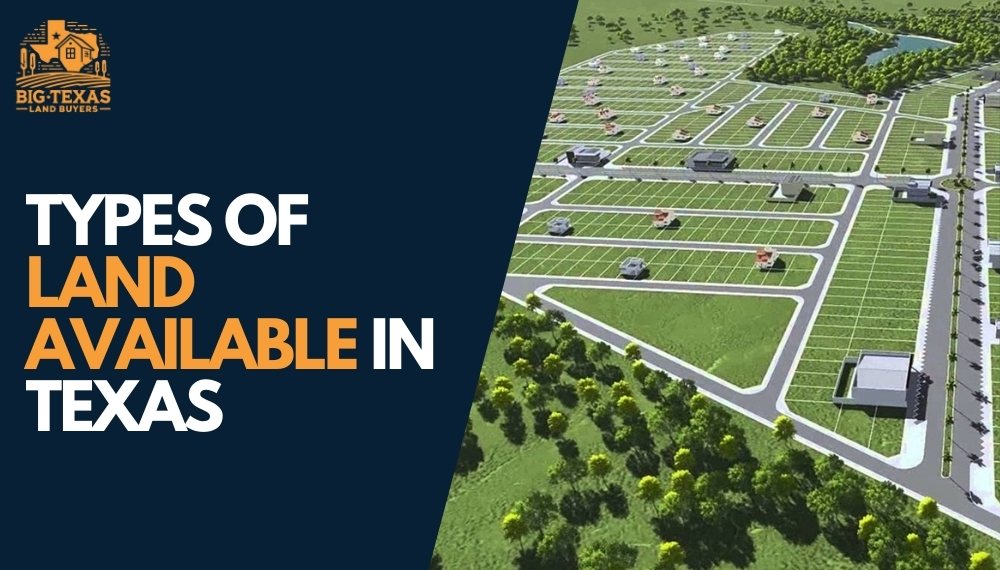Texas is one of the most sought-after states for land buyers due to its diverse landscapes, thriving economy, and rich cultural heritage. Whether you’re looking to invest in rural property, start a farm, or build your dream home, purchasing land in Texas offers numerous opportunities. However, the process can be complex, and there are several factors that land buyers in Texas should consider before making a purchase. This comprehensive guide will cover everything from understanding the Texas land market to navigating legal and financial aspects, ensuring that land buyers in Texas make informed decisions.
Understanding the Texas Land Market: What Land Buyers in Texas Should Know
Before diving into the specifics of purchasing land, it’s essential for land buyers in Texas to understand the market dynamics. Texas is a vast state with a diverse range of land types, each offering different benefits and challenges.
1. Regional Differences:
Texas is divided into several regions, each with its unique characteristics and land use opportunities. For example:
- East Texas: Known for its lush forests, East Texas is ideal for timber production, hunting, and recreational use.
- Central Texas (Hill Country): Famous for its rolling hills and scenic beauty, this region is popular for vineyards, ranches, and luxury homes.
- West Texas: Characterized by its arid climate and wide-open spaces, West Texas is ideal for cattle ranching and energy production, including oil and wind farms.
- South Texas: This region offers a blend of agricultural and recreational opportunities, with a climate suitable for farming and hunting.
Land buyers in Texas need to consider these regional differences when selecting a property that aligns with their goals.
2. Market Trends:
The Texas land market is influenced by various factors, including economic conditions, population growth, and development trends. For instance, areas near rapidly growing cities like Austin, Dallas, and Houston may see higher land prices due to increased demand for residential and commercial development. On the other hand, more rural areas may offer lower prices but could require additional investment in infrastructure. Staying informed about market trends is crucial for land buyers in Texas to make sound investment decisions.
3. Land Values:
Land values in Texas can vary significantly depending on location, size, and available amenities. For example, land with access to water, utilities, and good road infrastructure will typically command a higher price. Land buyers in Texas should research land values in their desired region to understand what constitutes a fair price and to avoid overpaying.
Types of Land Available in Texas

When considering purchasing land, land buyers in Texas should be aware of the different types of land available and their potential uses.
1. Agricultural Land:
Agricultural land is often the most sought-after by land buyers in Texas interested in farming, ranching, or simply enjoying the rural lifestyle. This type of land is typically priced based on its productivity, soil quality, and access to water. Buyers should consider whether the land is suitable for their intended agricultural activities, whether it’s crop farming, livestock grazing, or orchard development.
2. Recreational Land:
Texas offers vast areas of land ideal for recreational use, such as hunting, fishing, hiking, and camping. Recreational land can be a great investment for those looking to enjoy the outdoors or generate income through leases to hunters or tourists. When purchasing recreational land, land buyers in Texas should consider the presence of wildlife, water sources, and access to the property.
3. Residential Land:
For those looking to build a home, residential land in Texas ranges from urban lots to sprawling rural properties. Land buyers in Texas interested in residential land should consider proximity to amenities like schools, healthcare, and shopping, as well as the availability of utilities such as water, electricity, and sewage.
4. Commercial Land:
Commercial land in Texas is suitable for businesses, retail, and industrial development. When purchasing commercial land, location is key, as proximity to highways, transportation hubs, and population centers can significantly impact the property’s value and potential for success. Land buyers in Texas should also be aware of zoning laws and land use restrictions that may affect the types of businesses that can operate on the property.
5. Timberland:
Timberland is an attractive investment for those interested in forestry and timber production. East Texas, in particular, is known for its pine forests, making it a prime location for timberland investment. Land buyers in Texas should consider the type of timber on the land, the maturity of the trees, and the proximity to mills or processing facilities.
Legal Considerations for Land Buyers in Texas

Purchasing land involves navigating various legal aspects, and land buyers in Texas need to be aware of these considerations to avoid potential pitfalls.
1. Zoning Laws and Land Use Restrictions:
Zoning laws dictate how a piece of land can be used, whether for residential, commercial, agricultural, or industrial purposes. Land buyers in Texas should thoroughly investigate the zoning regulations for the property they are interested in to ensure their intended use is permitted. Additionally, some properties may have deed restrictions or covenants that limit certain activities or developments.
2. Water Rights:
Water rights are a critical consideration for land buyers in Texas, particularly in regions where water is scarce. Water rights determine who has access to water resources such as rivers, lakes, and groundwater. Buyers should verify the water rights associated with the property, including any restrictions on drilling wells or diverting water for agricultural use.
3. Mineral Rights:
In Texas, mineral rights can be separated from surface rights, meaning that the ownership of the land’s surface does not necessarily include the ownership of the minerals beneath it. Land buyers in Texas should clarify whether the mineral rights are included in the sale and understand the implications if they are not. If the mineral rights are owned by someone else, that party may have the right to access the property to extract minerals, such as oil or gas.
4. Easements and Right-of-Way:
Easements grant someone the right to use a portion of the land for a specific purpose, such as access to utilities or roads. Land buyers in Texas should review any existing easements on the property to understand how they might affect land use. Additionally, consider whether the property has adequate road access or if easements will be required to reach it.
5. Title Search and Insurance:
Conducting a title search is essential to ensure that the seller has clear ownership of the land and that there are no outstanding liens, disputes, or encumbrances. Land buyers in Texas should also consider purchasing title insurance to protect against any future claims on the property. Title insurance can provide peace of mind by covering legal costs if a title dispute arises.
Financial Considerations for Land Buyers in Texas

Purchasing land is a significant financial commitment, and land buyers in Texas should carefully consider their financing options and the associated costs.
1. Financing Options:
There are several financing options available for land buyers in Texas. Traditional banks, credit unions, and specialized lenders offer loans for land purchases. However, land loans often require a larger down payment and may have higher interest rates than residential mortgages. Land buyers in Texas should compare loan terms and choose the option that best fits their financial situation.
2. Property Taxes:
Property taxes in Texas vary by county and are based on the land’s assessed value. Land buyers in Texas should research the property tax rate in the area where they are purchasing land and factor this into their budget. It’s also important to determine if the land qualifies for any tax exemptions, such as agricultural or wildlife management exemptions, which can significantly reduce the tax burden.
3. Closing Costs:
Closing costs include various fees associated with the purchase, such as title insurance, survey fees, legal fees, and recording fees. Land buyers in Texas should budget for these additional costs, which can add up to several thousand dollars. Understanding the full cost of the purchase will help buyers avoid surprises at closing.
4. Land Improvement Costs:
Depending on the condition of the land, buyers may need to invest in improvements such as clearing vegetation, grading, installing utilities, or building access roads. Land buyers in Texas should factor in these potential costs when evaluating the total investment required for the property.
5. Future Value and Appreciation:
Land is generally considered a long-term investment, and land buyers in Texas should consider the potential for future appreciation. Factors such as population growth, infrastructure development, and economic trends can impact the land’s value over time. Buyers should evaluate the property’s potential for appreciation and how it aligns with their investment goals.
Steps to Closing the Deal
After identifying the right property and securing financing, land buyers in Texas will need to navigate the closing process.
1. Making an Offer:
Once you’ve found the perfect piece of land, the next step is to make an offer. Work with a real estate agent or attorney to draft a purchase agreement that outlines the terms of the sale, including the purchase price, contingencies, and closing date. Land buyers in Texas should be prepared to negotiate with the seller to reach a mutually agreeable deal.
2. Conducting Due Diligence:
Before closing, it’s essential to conduct due diligence to ensure there are no issues with the property. This includes reviewing the title, verifying zoning and land use regulations, checking for environmental concerns, and confirming water and mineral rights. Land buyers in Texas should also consider hiring a land surveyor to confirm the property’s boundaries.
3. Closing the Deal:
The closing process involves signing the necessary documents to transfer ownership of the land. Land buyers in Texas should be prepared to pay closing costs, which may include the down payment, loan origination fees, title insurance, and legal fees. Once all documents are signed and payments are made, the buyer will receive the deed to the property.
4. Post-Closing Considerations:
After closing, land buyers in Texas should ensure that the deed is properly recorded with the county. This makes the sale official and ensures that the buyer is recognized as the legal owner. Buyers should also update their contact information with the county tax assessor’s office to receive property tax statements.
Conclusion
Purchasing land in Texas is a significant investment that requires careful planning, research, and due diligence. Land buyers in Texas should understand the market, consider legal and financial aspects, and follow a structured approach to ensure a successful transaction. By doing so, buyers can secure the perfect piece of Texas land that meets their needs and offers long-term value. Whether you’re buying land for agriculture, recreation, or development, this guide provides the essential information you need to make informed decisions and navigate the complexities of the Texas land market.
Follow us:

